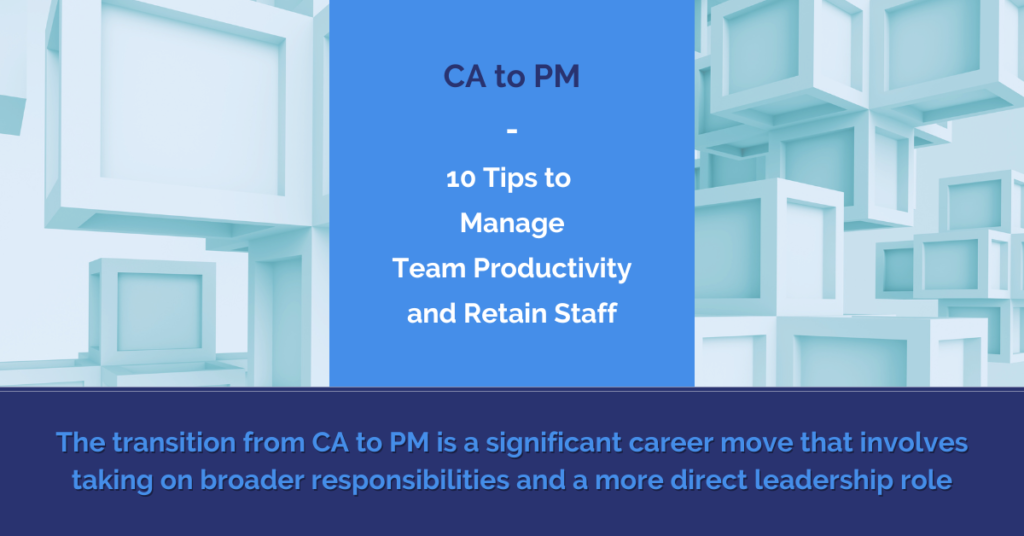Transitioning from a Contract Administrator to a Project Manager in construction is a significant career move that involves taking on broader responsibilities and a more direct leadership role. As a CA, you already have a deep understanding of contracts, compliance, and project documentation, which are essential skills for a PM. You may also have experience in managing one or two other CAs. However, managing a large team’s productivity and retaining staff requires additional strategies and skills.

Here are 10 practical tips to help you navigate the CA to PM transition effectively.
1). Develop leadership skills
Leadership is at the core of effective project management. As a PM, you need to inspire and motivate your team, set clear goals, and ensure everyone is working towards common objectives.
- Lead by example: Demonstrate the work ethic, professionalism, and dedication you expect from your team.
- Communicate effectively: Initially, more communication is better than less to convey project goals, expectations, and feedback clearly and effectively.
- Build trust: Foster trust by being transparent, reliable, and supportive. Keep your commitments and be honest with your team. Especially acknowledging when you make a mistake.
2). Understand team dynamics
It’s important to understand and manage team dynamics to ensure a productive and harmonious working environment.
- Recognise individual strengths: Identify the strengths of each team member and assign tasks that leverage these abilities.
- Promote collaboration and teamwork: Facilitate regular onsite meetings to discuss progress, outline tasks / responsibilities, and provide updates on milestones and changes (eg. scope or timelines) to keep everyone aligned with project goals.
- Address conflicts promptly: Resolve conflicts swiftly to prevent them from affecting team morale and productivity.
3). Prioritise clear communication
Effective communication is crucial for managing a productive team.
- Set clear expectations: Ensure that all team members understand their roles, responsibilities, and the project’s objectives.
- Provide regular updates: Keep the team informed about project progress, changes, and any issues that arise.
- Encourage open dialogue: Foster a supportive environment for team communication through regular formal meetings, one on one informal meetings, active listening, involving team members in decisions, an ‘open door’ policy, and by encouraging the team to share any concerns.
4). Implement efficient processes
Streamlining processes can significantly boost productivity. Consider implementing the following:
- Time management techniques: Encourage the use of time management techniques, such as the Pomodoro Technique (time blocking), to improve focus and productivity and also to help prevent burnout.

5). Foster professional development
Investing in your team’s professional growth can boost morale, productivity, and retention. Support your team’s development by:
- Providing training opportunities: Speak to your management about what training programs, workshops, and certifications you can offer your team relevant to their roles, as well as certifications focused on sustainable construction practices.
- Encourage skill development: Promote continuous learning by fostering team-wide skill sharing, advocating for mentorship opportunities, emphasising the advantages of learning / adopting new construction methods and technologies, and encouraging learning from both achievements and setbacks.
- Support career growth: Discuss career aspirations with your team and provide opportunities on your project that will help them progress towards these goals.
6). Recognise and reward achievements
Recognition is a powerful motivator. Regularly acknowledging the hard work and achievements of your team can boost morale and productivity. Consider:
- Public recognition: Celebrate achievements in team meetings or company communications.
- Personalised rewards: When possible, tailor rewards to individual preferences, such as offering early finishes or recommending them to Head Office for formal training programs.
- Performance-based incentives: One way could be to participate in a team member’s annual review. Alternatively, consider project-specific incentives when possible, like flexible work hours or work-from-home options for higher-performing individuals, for instance, those who meet or exceed deadlines while maintaining quality standards.
7). Promote a positive work environment
A positive work environment is essential for maintaining high morale and productivity. And from a recruiter’s standpoint, a positive workplace culture attracts and retains top talent.
- Encourage work-life balance: Promote a healthy work-life balance by offering flexible working hours and respecting personal time.
- Organise team-building activities: Facilitate occasional team-building activities to strengthen relationships and build a sense of camaraderie.

8). Set realistic goals and expectations
Setting realistic and achievable goals is crucial for maintaining team motivation and productivity. As such, you can:
- Break down large tasks: Divide large projects into smaller, manageable tasks with clear milestones.
- Align tasks with team capabilities: As much as possible ensure that tasks are aligned with the skills and capabilities of your team.
- Monitor progress: Regularly track progress and adjust as necessary to keep the project on track.
9). Provide constructive feedback
Regular and constructive feedback helps team members understand their strengths and areas for improvement. This is key to their personal and professional growth.
- Schedule regular check-ins: Conduct regular one-on-one meetings to discuss performance and provide feedback.
- Focus on solutions: When addressing areas for improvement, focus on solutions and provide support to help team members succeed.
- Celebrate successes: Acknowledge and celebrate successes to reinforce positive behaviours and achievements.
- Coffee catch-ups: Schedule informal meetings in a relaxed setting to foster open dialogue and check in with team members outside of the daily routine.
10). Be adaptable and resilient
Due to the dynamic nature of the construction industry, Project Managers must be adaptable and resilient to handle changes and challenges effectively.
- Stay informed: Keep up-to-date with industry trends, best practices, and new technologies.
- Be flexible: Be willing to adjust plans and strategies in response to changing circumstances.
- Maintain a positive attitude: Approach challenges with a positive and solution-oriented mindset to inspire confidence and resilience in your team.
The takeaway
Transitioning from a Contract Administrator to a Project Manager in construction involves developing additional skills and strategies to manage team productivity and retention effectively. By focusing on leadership, communication, professional development, recognition, and fostering a positive work environment, you can ensure that your team remains engaged, productive, and committed to the success of your projects. With these strategies in place, you’ll be well-equipped to lead your team and achieve long-term success in your new role as a PM.
And, if you found this article insightful, you might also be interested in ‘Future-Proof Your Career – Essential Skills for Construction Project Managers.‘ which emphasises not only the importance of staying relevant as a Project Manager but also how to grow and excel amid industry changes, positioning yourself as a leader in your field.
Looking for your next construction job? Search our current construction roles here, or to chat with our team about securing your next opportunity, get in contact with us through our Contact Us page.
Receive our updates straight to your inbox



